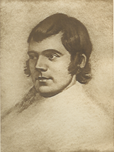To Mary In Heaven
by Robert Burns
I.
Thou ling'ring star, with less'ning ray,
That lov'st to greet the early morn,
Again thou usher'st in the day
My Mary from my soul was torn.
O Mary! dear departed shade!
Where is thy place of blissful rest?
Seest thou thy lover lowly laid?
Hear'st thou the groans that rend his breast?
II.
That sacred hour can I forget?
Can I forget the hallowed grove,
Where by the winding Ayr we met,
To live one day of parting love?
Eternity will not efface
Those records dear of transports past;
Thy image at our last embrace;
Ah! little thought we 't was our last!
III.
Ayr, gurgling, kiss'd his pebbled shore,
O'erhung with wild woods, thick'ning green;
The fragrant birch, and hawthorn hoar,
Twin'd am'rous round the raptur'd scene:
The flow'rs sprang wanton to be prest,
The birds sang love on every spray -
Till too, too soon, the glowing west,
Proclaim'd the speed of winged day.
IV.
Still o'er these scenes my mem'ry wakes,
And fondly broods with miser care!
Time but th' impression stronger makes,
As streams their channels deeper wear.
My Mary! dear departed shade!
Where is thy place of blissful rest?
See'st thou thy lover lowly laid?
Hear'st thou the groans that rend his breast?
Notes to the poem:
Mary Campbell, the heroine of this and several of his finest songs, belonged to the neighborhood of Dunoon, a village on the Frith of Clyde. She was in the service of Montgomery of Coilsfield when Burns first became acquainted with her. She was a beautiful girl, the beau-ideal of a "Scottish lassie," who was as good as she was beautiful. There had been some love passages, though not on his part, of a serious nature, between them, and when the rupture with the Armour family took place, his thoughts strayed towards Mary Campbell. There can be no doubt that very soon a deep and sincere attachment sprung up between them. It was arranged that Mary should leave her place in May, to prepare for her change of condition. Before she went to her father's house they met and parted, when the following ceremony was enacted between them: -
Taking up their postures on the opposite sides of a small brook, and holding a Bible between them, they exchanged vows of fidelity towards each other. They then exchanged bibles. The copy given to Mary has been preserved; it is in two volumes. On a blank leaf of the first volume is inscribed, in the poets handwriting, "And ye shall not swear by my name falsely: I am the lord" (Lev. xix. 12). In the second volume, "Thou shalt not forswear thyself, but thou shalt perform unto the Lord thine oath" (Matt. v.33). Another blank leaf in this volume bears his name and his masonic mark.
The lovers never met again. A few weeks after, Mary Campbell died suddenly at Greenock. A monument was erected over her grave by several admirers of the poet. On the third anniversary of the death of Highland Mary, Jean Armour, by that time his wife, tells us that, towards the evening, "he grew sad about something, went into the barnyard, where he strode restlessly up and down for some time, although repeatedly asked to come in. Immediately on entering the house he sat down and wrote, "To Mary In Heaven," an outpouring of passion, which Lockhart characterizes as "the noblest of all his ballads."
Burns's other poems of Highland Mary
Burns's Lament to Mary
The Highland Lassie
Highland Mary
Will Ye Go To The Indies, My Mary
Source:
The Poetical Works Of Robert BurnsCopyright 1910
Ward, Lock, and Co., Ltd
